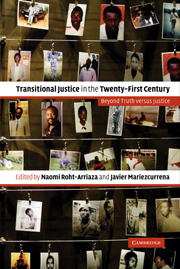Book contents
- Frontmatter
- Contents
- List of contributors
- Acknowledgments
- The new landscape of transitional justice
- Part I Truth, justice, and multiple institutions
- Part II Levels of justice: Local, national and international
- Introduction to Part II
- 7 A new approach to restorative justice – East Timor's Community Reconciliation Processes
- 8 Justice at the grassroots? Gacaca trials in Rwanda
- 9 Bremer's “Gordian Knot”: Transitional justice and the US occupation of Iraq
- 10 Truth, justice and stability in Afghanistan
- 11 The prosecution of Hissène Habré: International accountability, national impunity
- 12 Argentina's contribution to global trends in transitional justice
- 13 Transitional justice: Lessons learned and the road ahead
- Index
11 - The prosecution of Hissène Habré: International accountability, national impunity
Published online by Cambridge University Press: 05 June 2012
- Frontmatter
- Contents
- List of contributors
- Acknowledgments
- The new landscape of transitional justice
- Part I Truth, justice, and multiple institutions
- Part II Levels of justice: Local, national and international
- Introduction to Part II
- 7 A new approach to restorative justice – East Timor's Community Reconciliation Processes
- 8 Justice at the grassroots? Gacaca trials in Rwanda
- 9 Bremer's “Gordian Knot”: Transitional justice and the US occupation of Iraq
- 10 Truth, justice and stability in Afghanistan
- 11 The prosecution of Hissène Habré: International accountability, national impunity
- 12 Argentina's contribution to global trends in transitional justice
- 13 Transitional justice: Lessons learned and the road ahead
- Index
Summary
The regime of Chadian ex-President Hissène Habré, in eight years of repression (1982–90), was responsible for thousands of cases of political killings, torture, “disappearances” and arbitrary detention. After his ouster, the new government led by his former defense chief established a Truth Commission, but then buried its report and ignored its recommendations. Ten years later, Chadian and international activists joined forces to obtain Habré's landmark indictment in his Senegalese exile. Through several twists and turns, the case has survived and Habré now faces extradition to Belgium. The international prosecution had an immediate impact back in Chad, empowering his victims and putting transitional justice issues back on the table for the first time in many years. But Chad remains a repressive society with no tradition of accountability, and Habré's victims continue to wait for the Chadian government to address the suffering that they or their families endured.
Historical background
Chad, a former French colony half covered by the Sahara desert, is as far from the mainstream as any place on earth. Chad routinely makes it onto the list of the world's ten poorest countries. Half of its 8.7 million people can neither read nor write, and three-quarters have no access to clean drinking water. The average person can expect to live just 48 years. N'Djamena, the dusty capital, has no working traffic lights and no working elevators. Almost no one in Chad can afford to connect to the internet.
- Type
- Chapter
- Information
- Transitional Justice in the Twenty-First CenturyBeyond Truth versus Justice, pp. 278 - 300Publisher: Cambridge University PressPrint publication year: 2006
- 4
- Cited by



